I don’t just travel to amazing places here in Belarus! I also teach and otherwise engage with the academic community here. Note: This report was demanded — I mean, requested — by my dean. I aim to please!
Where do I teach?
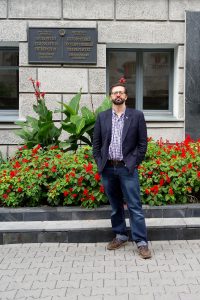
While I am visiting other places during the Fulbright, most of my teaching/presenting takes place in Minsk. My primary assignment is teaching at Belarusian State University. The dean of the combined faculties of philology, Ivan Semenovich Rovdo, is an affable older gentleman who knows some English and was happy that I spoke slowly enough and without a strong accent so that it was easy for him to understand me. He was impressed (or horrified!) that I am accompanied here in Minsk by my wife and four children and gave me chocolates for my family. Four children comprise a LARGE family for Minsk folks, but I am told that people in some areas of Belarus sometimes have larger families.
Who are my colleagues at the university?
The chair of the foreign language/literature department is Hanna Butyrchyk, and she is a delightful person to have for a boss — very easygoing, always greeting folks with a smile and “dobre dyeen” (good day), never ruffled by the daily business of running a diverse group of faculty. (Yes, I know. That sounds a little like a description of Margaret Thomas Evans, my chair at IU East.) Since I’m in Europe rather than the U.S. here in Belarus, I should probably say that she is the chair of “the Romano-Germanic philology faculty” (which includes English) rather than the foreign literature department. The foreign literature faculty all share one great big office, so I feel a little like a grad student instructor again. I never thought about how fortunate U.S. faculty are to have our own individual offices. If I used a shared office at IU East, I’d have to have a much larger home office for all my books and materials.
But sharing an office has its perks. I get to see many faculty members in my department on a regular basis. One colleague lives in the region of the city where my family lives right now. She commented that she loves seeing all the pictures I post of her (our) area. She is one of several faculty members with the name “Natalia.” This Natalia’s schedule overlaps with mine quite frequently, and she speaks English fluently. Another Natalia is a great graphic artist, whose cool art you can see (and buy!) here: http://npgallery.printdirect.ru/ Another Natalia is the office secretary/lab assistant, and her son is a trucker in Philadelphia — my wife’s favorite city. I’ve also gotten to know Valentina a bit. She teaches Victorian literature and speaks English as well, of course, given her area of study. And two graduate students from Iraq are also quite fluent in English, and I’ve enjoyed spending time with these two guys in a department mostly full of women — much like my home department at IU East. Alas, one of them (named Haider) returned to his home country last week after about nine years of graduate school here in Belarus. Haider wrote a dissertation on an English/Irish/American topic in English, then translated it into his newly acquired language of Russian, all while thinking in the Arabic language. It’s pretty amazing to me how he (or others here, for that matter) can juggle so many languages at such a high level. Another colleague named Marina teaches Romantic British Literature, specializing in the Lake Poets, and so she is able to converse with me in English and about nineteenth-century literary issues as well. These are a few of the folks I see almost every day that I’m at the office.
Who and what do I teach?
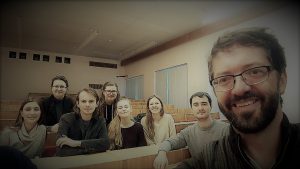
I teach a section of 5th-year students and a section of 4th-year students. Here the program is 5-1 (five years of undergrad study, one year for a master’s degree) instead of 4-2, and all students complete a specialist’s diploma during their fifth year. Students have very little choice in what courses they will take, so they usually advance through classes with the same group of classmates at the upper levels (at least) of their majors. Apparently, students find out what classes are being offered just before the first week of classes, and many of them were checking the schedule on the papers hanging outside the dean’s office for a few weeks into classes. (Online course schedules and registration are nonexistent here.) Those of you who teach in American universities know that we would be in hot water if we didn’t produce schedules and book lists long in advance of the semester, so that’s quite a change. But once the shifting and finding of classes was through (i.e. after a couple of weeks), things settled into a calm routine.
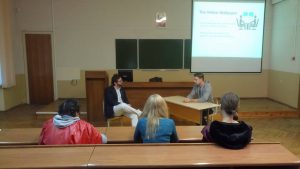
My 5th-year students are generally quite engaged and enjoy discussing literature. Some of them were initially a bit shy about speaking English to a real native speaker of English like me, but now they have grown more accustomed to it and are generally less reserved. We had an energetic discussion of Charlotte Perkins Gilman’s short story “The Yellow Wallpaper” on Wednesday, for example. This is a course on the American Short Story. My 4th-year students are mostly eager but less daring in their attempts to speak English, so I’ve been experimenting with different ways to get them involved in class discussion and activities. I’ve enjoyed doing learning activities such as character interviews, jeopardy review games, and movie/book comparisons, and think-pair-share writing activities. For this course on Gothic American literature, it helped that all students were familiar with the work of Edgar Allan Poe. This class takes place late in the day and night comes early here, so it’s getting dark (and sometimes dreary) by the time we leave, creating just the right atmosphere for a class on Gothic literature. For both classes, I am also preparing for student presentations and look forward to learning from them!
What other academic activities do I do as part of my Fulbright work?
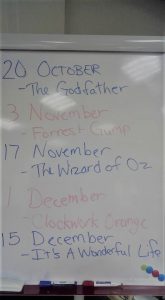
My academic reach extends beyond Belarusian State University, including presentations, workshops, and a club. I have given/am giving workshops and presentations for English-language teachers who gather in Minsk for U.S. Embassy-sponsored events. I lead an American film and fiction club at the Pushkin Library in Minsk every other Friday evening. We are viewing and discussing bits and pieces of several high-performing movie adaptations of works by American writers. The folks here are college age or (mostly) older – a highly-motivated group of individuals interested in English-speaking cultures and wanting to practice their English language skills. Since native speakers of English are few and far between in Belarus — even in a modern capital city like Minsk — I am received enthusiastically. Two weeks ago, we had a great discussion on To Kill a Mockingbird and other clips of movies we viewed. (This club meets every other week on Friday evenings.)
Since my Fulbright award is a “lecturing” assignment rather than a “research” assignment, I have no formal research projects connected to my work here. I am, of course, gathering pedagogical and cultural insights that may well play into my future research agenda. I am giving a lecture series on the Renaissances of American Literature, including the following: 1) the American Renaissance, 2) the Harlem Renaissance, 3) the Southern Renaissance, and 4) the Native American Renaissance. The lecture series is open to students and faculty at BSU.
I was joined by Marina (British romanticist mentioned above) and Sidney Karesh and Philip McGowan and others for a tour to Novogrudok where we visited the home of Adam Mickowicz. Philip McGowan, an Irishman at Queens University (Belfast), currently serves as President of the European Association for American Studies. Sidney is another Fulbrighter from the U.S. (in the Fulbright U.S. Student program for teaching English as a foreign language). She knows Russian fairly well and is a
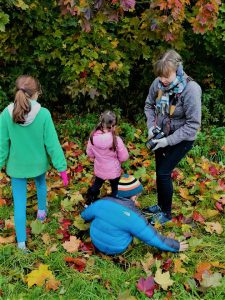
favorite with our kids, so it’s nice to have her as a willing and ablea babysitter and Russian teacher for our kids!

